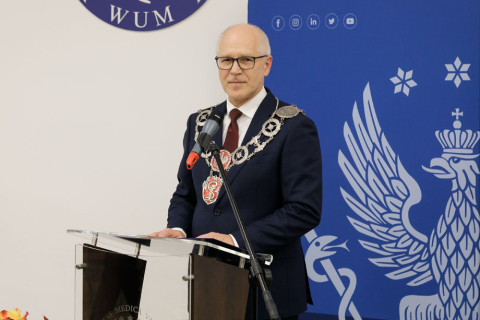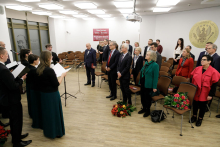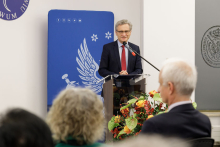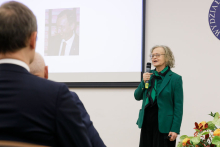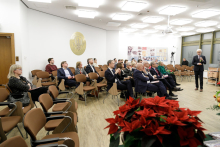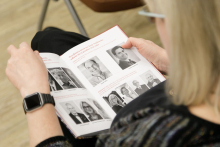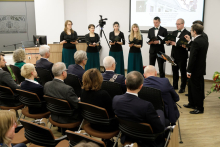The ceremony was organised by the Faculty of Medicine and hosted by its dean, Professor Rafal Krenke. The professor opened the session by explaining the uniqueness of Svante Pääbo’s discoveries and what caused him to receive the Nobel Prize:
– With his pioneering research, the Swedish scientist has achieved something that initially seemed impossible. He sequenced the genome of a Neanderthal, an extinct relative of modern humans. He also made another sensational discovery – a previously unknown fossil species of Denisova Cave Man, a Denisovan. Svante Pääbo discovered that the transfer of extinct human genes into the genome of modern humans followed the migration of our ancestors from the African continent approximately 70,000 years ago. Although it happened as long ago, he established that gene flow from extinct hominins still plays an important role, influencing, among other things, how our immune system responds to infections. His research underpins the new scientific discipline of palaeogenomics. Among other things, it describes the genetic differences between humans living today and hominids that became extinct decades ago.
The details of the research conducted by this year’s Nobel laureate were discussed by the experts invited to the session. The lecture titled “Svante Pääbo – the road to genomes” was given by a Biology Professor Ewa Bartnik, PhD from the Institute of Genetics and Biotechnology, Faculty of Biology, University of Warsaw. In her presentation, she cited many papers published by the Swedish scientist available on PubMed. These primarily concern the Neanderthal genome.
– One of Pääbo’s papers states that we have inherited “something” from a Neanderthal in chromosome 3 that causes the risk of death to double if a person is hospitalised with COVID-19. The second paper concerns a gene in chromosome 12, this gene can protect us against infection, said Professor Bartnik. During her speech, she also mentioned the results of the research, which the Nobel laureate talked about during his lecture “The Neanderthal Genome and The Evolution of modern humans” on 7 December. They conclude that there is some Neanderthal variant of a gene that increases the sensation of pain. Which not only has relevance for science, but also somewhat changes the stereotypical perception of Neanderthals as primitive creatures.
Describing Pääbo's scientific path, Professor Ewa Bartnik highlighted not only the scientific achievements, but also the personality traits that led the Swedish scientist to the Nobel Prize.
– Various descriptions say that he is characterised by great determination. In doing so, he has the ability to attract and win people over. In his work, he needed the help of chemists, biologists and computer scientists – and he was able to convince them. It is rare to find a scientist so determined and focused on what they want to achieve – concluded the expert from the University of Warsaw.
A slightly different aspect of the scientific journey of this year’s Nobel laureate was presented by Professor Rafał Płoski from the Department of Medical Genetics of MUW. His lecture “How to sequence something that is almost non-existent,” paints a picture of Svante Pääbo – an innovator who achieves the almost impossible.
– Ancient DNA is something that is almost non-existent. In addition to the microscopic amount of material, there are additional problems. Such DNA is fragmented, massively contaminated with foreign genetic material from micro-organisms or contemporaneous DNA. All this makes the risk of false positives enormous. To avoid such results, Pääbo proposed criteria for the authenticity of ancient DNA. In addition, he refined and introduced into genetics a method of DNA isolation based on the use of silica beads. They bind the genetic material and do not bind the contaminants that may be on it, emphasised Professor Ploski. He also noted that in his work, Svante Pääbo used state-of-the-art DNA sequencing technology, with Next Generation Sequency, which allows billions of molecules to be sequenced simultaneously. Using this method and his isolation method, the Swedish scientist has sequenced around one million Neanderthalchytic bases.
Then there were other innovations that our expert discussed, including analysis of the mechanism of post-mortem DNA damage, or single-stranded sequencing. This has paid off with ground-breaking reports. The first involved a Denisovan. From a tiny fragment of phalangeal bone, a genetic sequence was obtained with so-called high coverage, the kind that is obtained in medicine today. The second paper was the culmination of research into Neanderthal DNA – that is, its complete genome.
As Professor Płoski stressed, Pääbo’s spectacular achievements would certainly not have been possible without the refinement of DNA isolation and sequencing techniques and modern Next Generation Sequency technology.
The Nobel Session concluded with a mini-concert of Christmas carols performed by the MUW choir under the direction of Daniel Synowiec.
The guests of the Nobel Sessions: prof. Zbigniew Gaciąg, Rector, prof. Paweł Włodarski, Vice Rector for International Relations, Development and Promotion, dr hab. Piotr Luliński, Dean of the Faculty of Pharmacy, dr hab. Ewa Czochrowska, Vice Dean of the Faculty of Dental Medicine, prof. Michał Grąt, Director of the Doctoral School, dr hab. Łukasz Czyżewski, Vice Dean of the Faculty of Health Sciences, prof. Maciej Słodkowski, Director of the Centre for Postgraduate Education of the MUW, dr hab. Maciej Dawidowski, Vice-Chair of the Pharmaceutical Sciences Disciplinary Board, prof. Leonora Bużańska, Director of the Institute of Experimental and Clinical Medicine of the Polish Academy of Sciences, prof. Marek Krawczyk, former MUW Rector, dr Marta Kijak-Bloch, Chancellor, Jolanta Ilków, Bursar.
